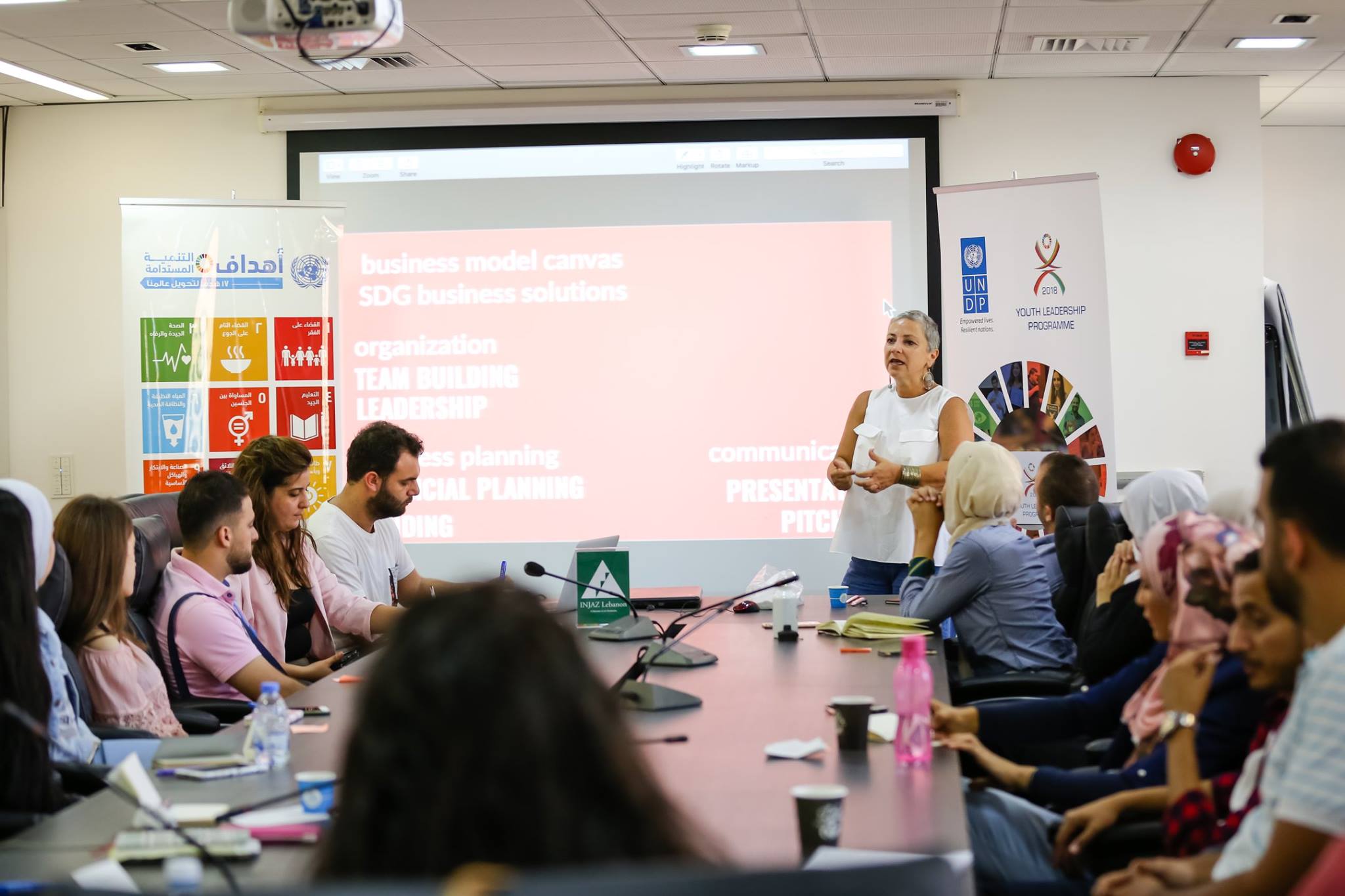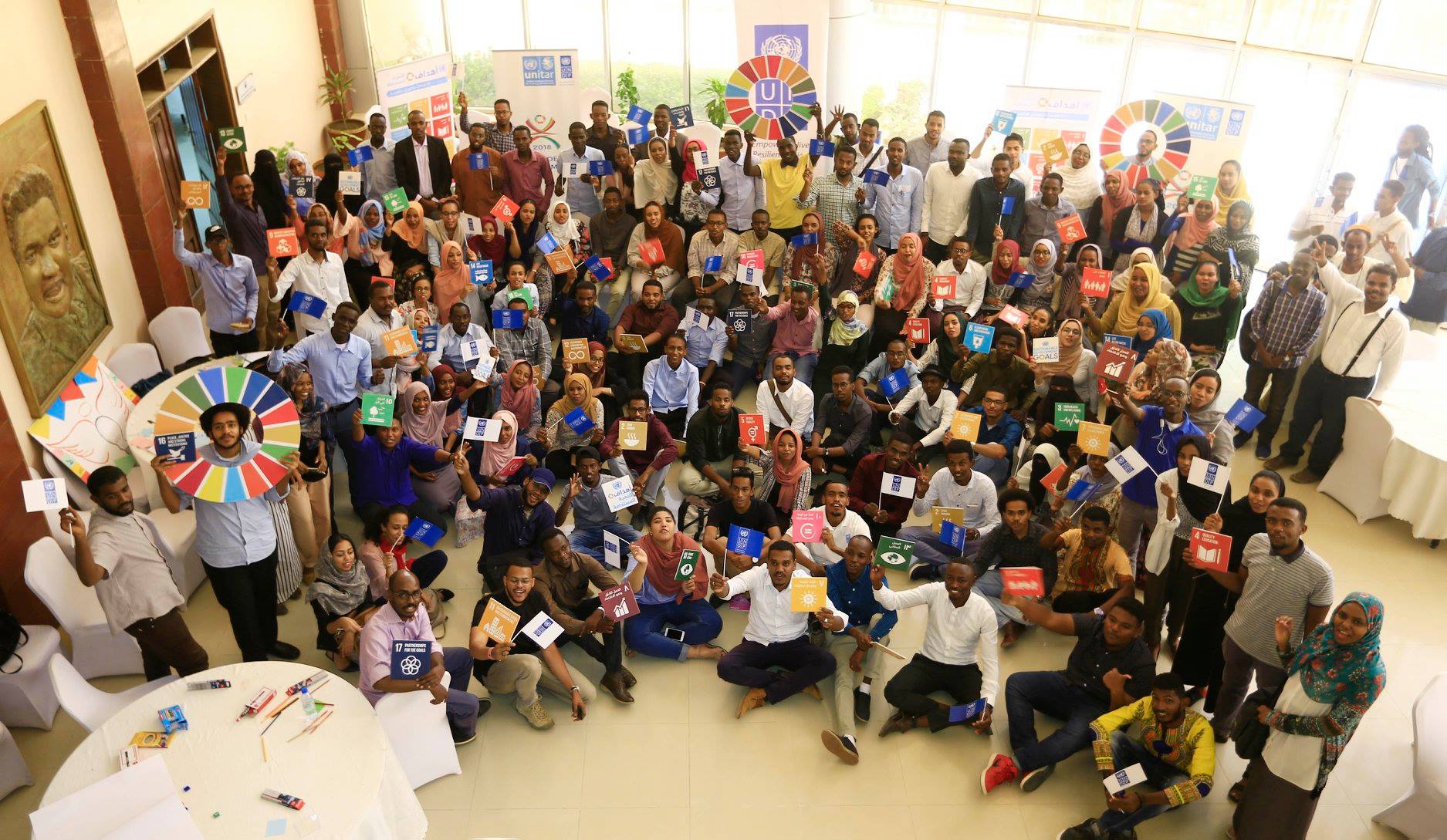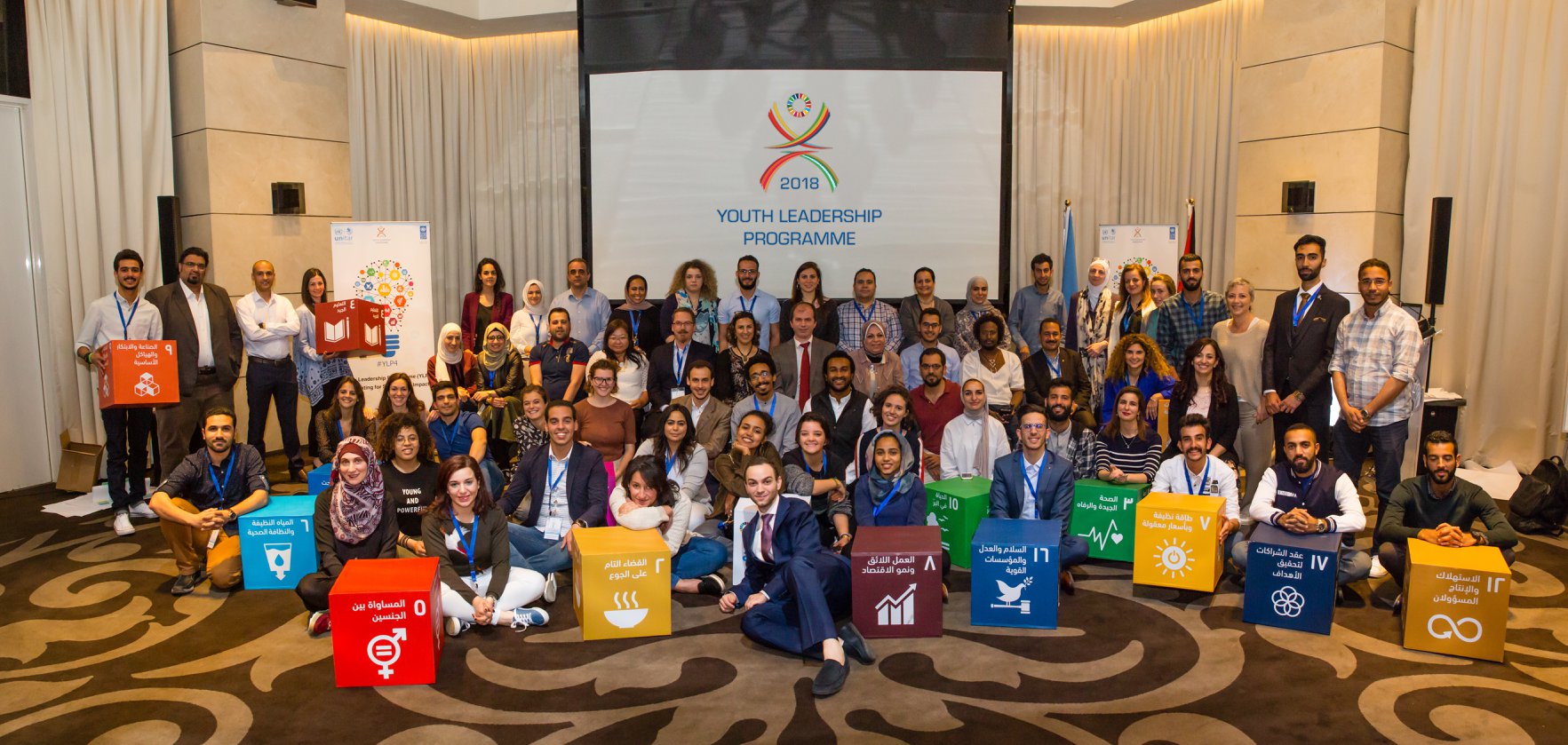Youth Leadership Programme (YLP)
Description
The Youth Leadership Programme (YLP) launched in 2015 to build the region's most dynamic network working at the intersection of youth, innovation and sustainable development. YLP has run four successful cycles and, as of end of 2018, has worked with over 7,000 youth participants and supported 5,000+ projects. YLP participants have launched and established successful small businesses, won municipality elections, received recognition and awards for their innovative solutions, and presented their ideas at renowned universities and global platforms like the ECOSOC Youth Forum within the UN Headquarters in New York, Stanford University, Hult International Business School, and the European Parliament.
As the Arab region is home to the youngest population in the world, with over 100 million youth between the ages of 15 and 29 - these young men and women have the potential to drive significant change and promote the Sustainable Development Goals (SDGs). However, they are faced with several challenges that make it difficult for them to become change-makers without the proper resources and support. Despite widespread stereotypes about unmotivated and unskilled youth in the region, it has been demonstrated that they tend to be “better educated and more connected to global knowledge relative to older ages.” This indicates that it is not the lack of skills, but rather of available opportunities, that prevents them from becoming change-makers in their communities. <br />
Youth Leadership Programme (YLP) is a solid, positive step to foster youth inclusion in a number of Arab States. The recently released UN Youth Strategy (2018-2021) has prioritized promoting the civic and political engagement of youth, noting that the UN must leverage its capacity in order to promote youth participation in public affairs at all levels. Young change-makers are identified and supported in this program and closer collaboration is fostered among the government, civil society, and private sector through this initiative. <br />
YLP equips and transforms the lives of young people in the Arab states and demystifies the stereotype of young Arabs as universally, perpetually in despair. While indeed many Arab countries are in a state of turmoil, the truth is that young people across the region are finding ways to keep their societies moving forward our UNDP YLP. We are providing the interlinks of SDGs and institutional changes by working with young people in every Arab country who are putting their creativity to the service of their communities, using technology and innovation to support change that matters in daily life.<br />
In 2018, YLP was recognized for its impact and work by the UNICEF Generation Unlimited campaign - a global partnership that aims to ensure that every young person is in education, learning, training or employment by 2030.<br />
As the programme has been successful and popular across the region, attracting immense talent and diverse skill sets, the plan for the next three years is to scale up and extend the reach to over 100,000 young people and 1,000 youth-serving organizations. In order to do so the programme is working on introducing a number of tools, platforms and ideas that will enhance the collective knowledge and bring people together on national and regional levels.
As the programme has been successful and popular across the region, attracting immense talent and diverse skill sets, the plan for the next three years is to scale up and extend the reach to over 100,000 young people and 1,000 youth-serving organizations. In order to do so the programme is working on introducing a number of tools, platforms and ideas that will enhance the collective knowledge and bring people together on national and regional levels:
1. Exploring new mechanisms of support, beyond the traditional approaches, to advance youth development solutions. YLP will develop a new platform that will encourage networking opportunities to explore forward thinking, analyze emerging trends and foresee upcoming developments. The platform will facilitate exchange of expertise, building collective knowledge and offering collaboration opportunities that will cross borders of countries as well as thematic areas. In addition, the platform will help provide and facilitate global networking opportunities, conferences and forums to extend reach to show case youth projects and prototypes.
2. Experimenting to strengthen the design of solutions and learn through experimentation. We are determined to support 1. Strategic thinkers that can collectively tackle a tough challenge, 2. Crafty experimenters that are constantly looking for ways to test what they’re working on, so they can better understand how it works and how to improve it and 3. Systems thinkers to design solutions that take into account the different parts of a society to be connected and impact each other. YLP would mobilize the means required to implement this agenda based on a spirit of strengthened global solidarity. The programme aims to establish a grants scheme that would offer financial and technical support to young innovators and change makers.
3. Expanding knowledge by institutionalizing the YLP approach. To enhance the collective knowledge and build the capacity of its participants, the programme will launch an online Learning Facility that will host several materials, guides and manuals that YLP participants can access. A new curriculum on topics and solutions identified during the first four years of the programme will be developed. In the era of technological advancement and virtual conduct of business, the curriculum will contain learning materials on digital literacy with demand-driven thematic courses and training. These skills are vital for participants’ development solutions to succeed and reach a wider audience.
YLP believes that investing in expanding knowledge, networking and resources will facilitate the scale up process and support participants in becoming global competitors in innovation, solution mapping and change- makers and a force for change across the region. Once taken to the new heights this programme has the potential to revolutionize the way youth can contribute to the development, peace and stability in their communities and around the globe.
Building on the lessons learned and momentum generated during YLP1-4, YLP5 is set to launch in 2019. As part of YLP5, UNDP will partner with youth-serving organizations in countries across the Arab region to host national activities designed to support and empower a diverse set of young women and men change-makers, as they design, implement and scale innovative, impactful and sustainable development solutions. In addition, two regional events will be held to launch and support the programme, bringing together youth, youth-serving organizations, policy makers and relevant stakeholders from across the region.
The expected outputs are that we will first and foremost strengthen the capacity and skills of youth participants, enabling them to become effective political and civic leaders, thinkers, innovators, and change-makers. The expected indicators for assessment and evaluation include the number of thematic curriculums developed to support young innovators/change-makers, the level of support to Country Offices to facilitate growth and innovation, the number of new initiatives created by the YLP participants, the level of impact on the collective knowledge of YLP, and the number of knowledge product finalized on civic and political participation
We also will consolidate and expand YLP’s network of youth-serving partner organizations to strengthen the ecosystem for youth-led innovation for development in the Arab region. The expected indicators include the number of YLP participants that joined the networking platform, the social media campaign finalized and launched, and the number of social media followers across all platforms (Twitter, Facebook).
Finally we will create a knowledge-sharing platform to provide youth and partners with access to innovative materials, methodologies, and tools related to political and civic engagement and social innovation. The expected indicators for output three is the number of new private sector partners engaged, the level of support provided to Cos, and thenumber of social media followers across all platforms (Twitter, Facebook).
The workshop will bring together 80 youth-focused organizations from the participating countries over three days. It will provide a collaborative space where participants can engage in various sessions designed to familiarize them with the aims of YLP, facilitate the development of networks among participants, and develop skills that will enable them to support youth in becoming political, civic, and policy change-makers. This workshop will also create a space for youth to discuss regional priorities and strategies to End Violence Against Women (EVAW) with the support of UN Women.
The main objectives of the first YLP5 Regional Workshop are to expand our knowledge by institutionalizing the YLP approach and developing an online Learning Facility. Secondly, we push to explore new mechanisms of support to advance youth development solutions. Lastly, we desire to experiment with new ways of maximizing the YLP network of youth-focused organizations, Youth and development partners.
Following the regional event, YLP5 will continue to provide access to technical expertise, networking opportunities, and financial resources for participating organizations and youth through the national activities, leading up to the second regional workshop. This workshop will encourage youth to exchange experiences and knowledge to foster innovation in order to remove barriers for gender equality as well as end violence against women.
External factors and constraints in the region include that unemployment among youth in Arab States is the highest in the world, 30 percent in 2016, comparing to 13 percent worldwide . The region struggles with an ongoing exclusion of young women and restricting their capabilities and opportunities. Women in the region still face discrimination - the issues are exaggerated even more in countries facing conflict or post-conflict transition. The implementation of the Sustainable Development Goals in the region is vital for the young people to progress and become effective leaders and social innovators and of the future. Financial Support is an enabling factor and may become a constraint as without the resources required to implement our vision we will not be able to realize our ideas into projects and provide youth the best methods and tools to create positive, sustainable chance.
Since its inception four years ago, YLP has been designed and implemented with the goal of becoming a sustainable model that relies on high quality interventions, and on the enthusiasm, passion and dedication of the program participants themselves. The youth participants are part of every phase of the program, with their responsibilities increasing over the four years from recipients in YLP1 to serving as trainers, mentors and implementers in YLP4. This approach has helped not only establish a cadre of innovative and engaged youth, but youth who are actively taking part in supporting the development of their incoming peers.
Sustainability is also envisioned through reliance on an online platform that in the long-run will be a low-cost and high-impact initiative operated and managed by the youth-serving organizations themselves. For the establishment of the Hubs, the program leverages on the facilities and resources of its partners which include youth serving organizations, ministries and councils, and incubators. These hosting organizations will be provided with the knowledge and know-how to independently operate them as well as to connect and collaborate with the other Hubs in the region.
In considering the regional level the workshosp will consist of technical and hands-on sessions, complemented by the participation of inspirational speakers who will share experiences on how to develop youth talent, launch sustainable social enterprises and initiatives, and become agents of change. Experts and speakers from UNDP, UNITAR, national/regional partners, and private sector/academic institutions, in addition to entrepreneurs, innovators, and activists, will facilitate Sessions. The Regional Workshop will also count on the presence of former YLP1, 2, 3, and 4 participants, who will act as inspirational speakers and mentors during the event. This will enable the training to continue outside of the formality of the programme.
YLP is in every way a tool for our participants, partners and communities as well as for UNDP. We have successfully piloted a rapidly growing programme for youth that has already made its marks on the region. Therefore, we know that if taken to new heights this programme has the potential to revolutionize the way youth can contribute to peace and sustainability in their communities and across the globe. UNDP Country Offices in the Arab States region will work closely with the YLP5 regional team to identify and engage national youth focused organizations, based on a rigorous selection process using specific criteria to ensure that we build upon the lessons learned from past years. We will continue to select youth who have demonstrated professional experience and knowledge in supporting youth in development and have a strong proven record, with quantifiable results, of making an impact on the youth in their communities.<br />
We will also ensure that the individuals participating in the program have an extensive reach in the number of youth involved in their programmes. We are continuing to strike new ground with our strong, demonstrable connection to Agenda 2030. We understand the exchange of familiarity with social innovation methodologies, especially design thinking with participants and them with us. In lessons learned we understand there must be a willingness and commitment to collaborate with UNDP as well as to have capacity (people, time, resources) to commit to YLP4 national activities. Key factors for impact include having a diverse staff (gender, people with disabilities, age, etc.)
SDGS & Targets
Deliverables & Timeline
Resources mobilized
Partnership Progress
| Name | Description |
|---|---|
| 14.1 | By 2025, prevent and significantly reduce marine pollution of all kinds, in particular from land-based activities, including marine debris and nutrient pollution |
| 14.2 | By 2020, sustainably manage and protect marine and coastal ecosystems to avoid significant adverse impacts, including by strengthening their resilience, and take action for their restoration in order to achieve healthy and productive oceans |
| 14.3 | Minimize and address the impacts of ocean acidification, including through enhanced scientific cooperation at all levels |
| 14.4 | By 2020, effectively regulate harvesting and end overfishing, illegal, unreported and unregulated fishing and destructive fishing practices and implement science-based management plans, in order to restore fish stocks in the shortest time feasible, at least to levels that can produce maximum sustainable yield as determined by their biological characteristics |
| 14.5 | By 2020, conserve at least 10 per cent of coastal and marine areas, consistent with national and international law and based on the best available scientific information |
| 14.6 | By 2020, prohibit certain forms of fisheries subsidies which contribute to overcapacity and overfishing, eliminate subsidies that contribute to illegal, unreported and unregulated fishing and refrain from introducing new such subsidies, recognizing that appropriate and effective special and differential treatment for developing and least developed countries should be an integral part of the World Trade Organization fisheries subsidies negotiation |
| 14.7 | By 2030, increase the economic benefits to Small Island developing States and least developed countries from the sustainable use of marine resources, including through sustainable management of fisheries, aquaculture and tourism |
| 17.14 | Enhance policy coherence for sustainable development |
| 14.a | Increase scientific knowledge, develop research capacity and transfer marine technology, taking into account the Intergovernmental Oceanographic Commission Criteria and Guidelines on the Transfer of Marine Technology, in order to improve ocean health and to enhance the contribution of marine biodiversity to the development of developing countries, in particular small island developing States and least developed countries |
| 14.b | Provide access for small-scale artisanal fishers to marine resources and markets |
| 14.c | Enhance the conservation and sustainable use of oceans and their resources by implementing international law as reflected in United Nations Convention on the Law of the Sea, which provides the legal framework for the conservation and sustainable use of oceans and their resources, as recalled in paragraph 158 of "The future we want" |
Feedback
Action Network


Timeline
Entity
Region
- West Asia
Geographical coverage
Photos



Website/More information
Countries
Contact Information
Kawtar Zerouali, Regional Programme Manager
